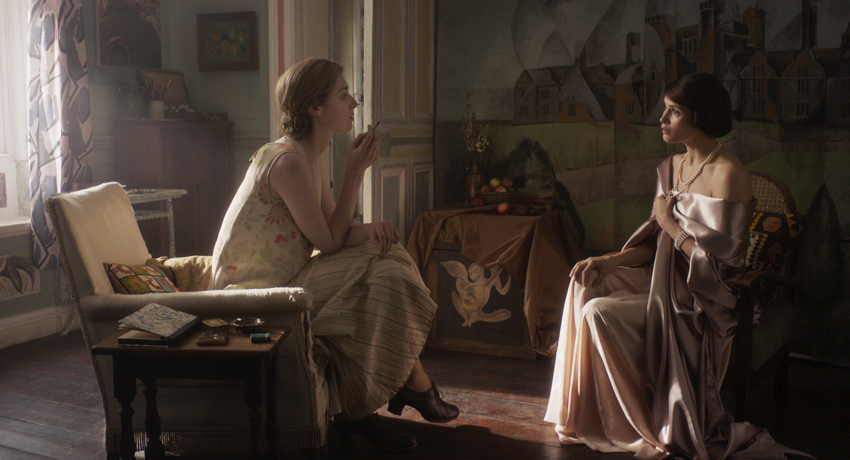

Dir-Scr Chanya Button | Evangelo Kioussis. With Gemma Arterton, Elizabeth Debicki, Isabella Rossellini. UK-Ireland 2018. 110min.
How can a film about two of the 20th century’s most colourful female characters be so underwhelming? Drawing from Eileen Atkins’ 1993 play, Chanya Button’s biopic explores the lesbian relationship between Vita Sackville-West and Virginia Woolf without ever mining its incendiary dramatic potential. It is a drama without drama, lacklustre and trivial despite its lush, unconventional pretensions.
Elizabeth Debicki is suburb as the rather awkward blue-stocking Wolfe. And she towers above Arterton’s impishly pedestrian portrait of glamorous socialite and gardening expert Sackville-West (doyenne of Sissinghurst Castle, whose Grade I listed gardens is one of the most famous in England). Sadly, the only reference to horticulture is a rather odd attempt at magic realism that sees CGI ivy sprouting out of the floors.
Vita & Virginia looks absolutely sumptuous in its rich 1920s Arts & Crafts settings (including medieval Knole House) but the film plays out like an insipid soap opera, its lacklustre characters simply going through the motions. There’s a great deal of pouting and misty close-ups of lips; but in the end nothing vaguely illuminating happens, and we left in the dark about these avant-garde women. Director Chanya Button has had a promising career so far with several awards for her filmmaking. Yet this most fascinating of themes: LGBTQ, horticulture and literature fails to ignite on any level.
Part of the problem is the script – written by Button and Atkins – which simply traces the steps that lead to Woolf’s sexual awakening in rather tepid bed scenes, rather than probing the depths of their intellectual attraction. In fact, Vita emerges a rather bored, housewife with a faux posh accent, rather than a highly creative aristocrat and free-thinking intellectual. The two exchange excerpts from twee love letters bringing nothing constructive to the party. And to cast Isabella Rossellini as Arterton’s on-screen mother, Baroness Sackville, is a grave mistake – the two couldn’t be more different. Rossellini exudes charisma in her role, threatening to cut off her daughter’s allowance if she doesn’t behave.
Vita is married to a suave bisexual diplomat Sir Harold Nicholson (Rupert Penry-Jones in fine fettle) and Woolf is supported by her loving husband Leonard (Peter Ferdinando) who recognised her need for stability. Vita worships her from afar and the women finally meet at a bohemian Bloomsbury party. From then on a friendship develops – although the two share no chemistry to speak of. Vita is 30, Virginia 10 years her senior. Debecki adds subtle layers of depth to her character, including an impressive accent, redolent of the era. Her sister is the painter Vanessa Bell (Emerald Fennell) who lives with a gay artist Duncan Grant (Adam Gillen).
Although this is essentially Vita’s story, the emotionally delicate Virginia steals the show as a highly enigmatic character who is in the process of penning the radical 1928 novel Orlando, an experience that appears initially to thrill her far more than her lesbian dalliance with the “Sapphic” Sackville-West, and encapsulates the male/female duality of her character. Virginia gradually becomes more involved in the relationship which eventually destabilises her (she in fact went on to commit suicide) and this is shown through convincing CGI rooks sweeping down in the gardens of the Knole.
Button certainly exposes the lesbian relationship between her characters but that’s really all the film does. Vita & Virginia is a missed opportunity to offer something more invigorating about the women themselves, and what attracted them to each other in the first place. MT
ON BFI SUBSCRIPTION FROM 24 May 2022
https://youtu.be/mPHxrdIneP4